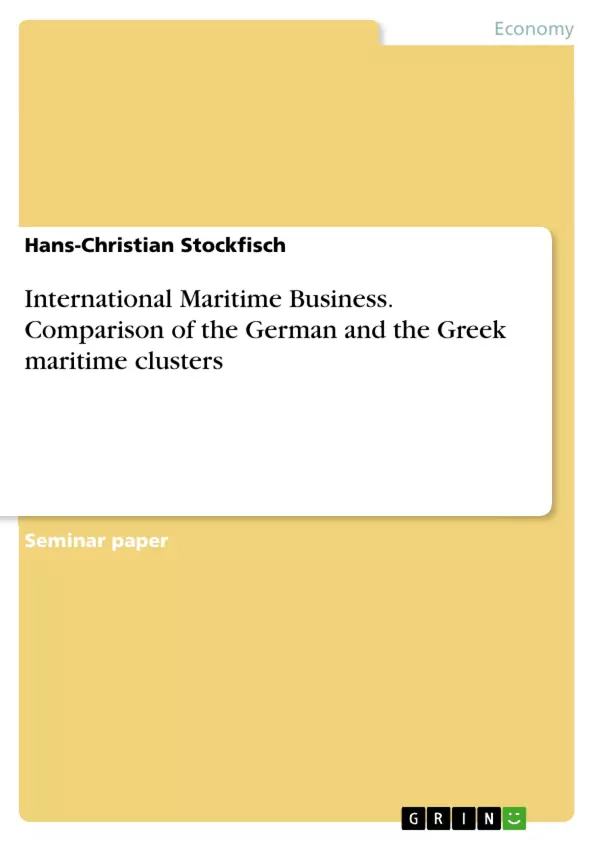The purpose of this paper is to analyze the differences and similarities among shipping firms in the German and the Greek maritime clusters. In this context, market, financial, organizational, human resources and management related issues are identified and discussed.
The two major European players in the global shipping market, namely the German and the Greek shipping firms, are currently facing several enormous challenges. The impact of global economic downturn, the crisis in the main shipping sectors and the changes in the pattern of world trade all profoundly affect the maritime transport industry (De Monie, Rodrigue und Notteboom 2011). However the Greek shipping companies seem to manage their businesses in the crisis more successfully than their German competitors. Therefore a report on the differences and similarities among shipping firms in the German and the Greek maritime clusters is of high interest. Even though both players focus on different segments in the maritime markets, that have different rules and conditions, the main parameters and aspects of their businesses will be compared. The focus of this report lies on market, financial, organizational, management and human resources related issues. Since these issues mainly touch strategic management decisions, this report will not go to deeply into the operational aspects of the businesses such as using Key Performance Indicators (KPI´s) or other methods and applications that would serve these types of issues. The use of KPI´s would also demand the same source of their collection to have an objective analysis, but since both players operate on different markets, only a small proportion of their KPI´s would be comparable. Furthermore this paper will focus purely on companies that operate ships. Hence, ports, hinterland-logistics, education- or administration-facilities belonging to the maritime cluster will not be taken into account. After the German and Greek shipping firms have been compared, the report will highlight aspects that differentiate the particular maritime clusters and conclude with similar short prospects both players likely will face in the future.
Inhaltsverzeichnis (Table of Contents)
- 1. Introduction
- 2. German shipping firms
- 2.1 Market-Focus
- 2.2 Finance
- 2.3 Organizations and Management
- 2.4 Business Model
- 2.5 Human Resource Management
- 2.6 Fleet
- 3. Greek shipping firms
- 3.1 Market-Focus
- 3.2 Finance
- 3.3 Organizations and Management
- 3.4 Business Model
- 3.5 Human Resource Management
- 3.6 Fleet
- 4. Contrast
- 4.1 Different Businesses
- 4.2 Shared Challenges
- 5. Conclusion
- 6. Sources
Zielsetzung und Themenschwerpunkte (Objectives and Key Themes)
This paper aims to analyze the differences and similarities among shipping firms in the German and Greek maritime clusters. The analysis focuses on market, financial, organizational, human resources, and management-related issues.- Market Focus of German and Greek Shipping Firms
- Financial Structures and Strategies in German and Greek Shipping
- Organizational Structures and Management Practices in German and Greek Shipping
- Human Resource Management in German and Greek Shipping
- Fleet Composition and Development in German and Greek Shipping
Zusammenfassung der Kapitel (Chapter Summaries)
- Chapter 1: Introduction - This chapter provides an overview of the global shipping market and the challenges faced by both German and Greek shipping firms. It highlights the impact of the global economic downturn, the crisis in the main shipping sectors, and the changes in the pattern of world trade. The chapter also states the purpose of the report, which is to compare and contrast the differences and similarities between German and Greek shipping firms, focusing on market, financial, organizational, management, and human resource related issues.
- Chapter 2: German shipping firms - This chapter focuses on the characteristics of German shipping firms, including their market focus, financial structures, organizational structures, business models, human resource management practices, and fleet composition.
- Chapter 3: Greek shipping firms - This chapter focuses on the characteristics of Greek shipping firms, including their market focus, financial structures, organizational structures, business models, human resource management practices, and fleet composition.
- Chapter 4: Contrast - This chapter compares and contrasts the differences and similarities between German and Greek shipping firms, identifying aspects that differentiate the two maritime clusters. It also highlights the shared challenges both players are likely to face in the future.
Schlüsselwörter (Keywords)
The main keywords and focus topics of this paper are: German shipping, Greek shipping, maritime clusters, market analysis, financial structures, organizational structures, human resource management, fleet composition, strategic management decisions, Key Performance Indicators (KPIs), global shipping market, global economic downturn, crisis in shipping sectors, changes in world trade patterns.Frequently Asked Questions
How do German and Greek shipping firms differ in market focus?
German firms often focus on container shipping, while Greek firms have a strong presence in the bulk and tanker markets, allowing them to adapt differently to economic crises.
What are the financial challenges for the German maritime cluster?
The German cluster has faced significant challenges due to the decline of the KG (Kommanditgesellschaft) model and the impact of the global economic downturn on container trade.
Why did Greek shipping companies manage the 2008 crisis better?
Greek companies often rely on internal family capital and flexible business models, which provided more resilience compared to the debt-heavy structures of some competitors.
What role does Human Resource Management play in shipping?
HRM is crucial for managing diverse international crews and maintaining high safety standards, with both clusters facing the challenge of attracting qualified personnel.
What is a maritime cluster?
A maritime cluster is a network of shipping-related organizations, including ports, shipowners, and administration facilities, that contribute to a region's economic performance.
- Arbeit zitieren
- Diplom Kaufmann Hans-Christian Stockfisch (Autor:in), 2014, International Maritime Business. Comparison of the German and the Greek maritime clusters, München, GRIN Verlag, https://www.grin.com/document/286516



